The officiating blunders and controversial calls that still haunt Wisconsin sports fans
- Oops!Something went wrong.Please try again later.
- Oops!Something went wrong.Please try again later.
- Oops!Something went wrong.Please try again later.
Wisconsin's would-be goal line stand against Purdue, called a touchdown on a 4th-and-1 play and inexplicably upheld on review, didn't ultimately change the outcome in Wisconsin's uplifting 35-24 win at Camp Randall Stadium on Saturday. But it sure was strange.
I ask this sincerely.
What is the point of replay if we stop the game for a review to just uphold the call on the field that this is a TD?!? pic.twitter.com/Oz1EyC4O8w— Ben Stevens (@BenScottStevens) October 22, 2022
“They said they didn't have a view straight down the goal line, which leads me to the question of, Why? Why is it not straight down the goal line?" Badgers coach Jim Leonhard said afterward. “They didn't have enough to overturn it. I don't agree with it, but it doesn't really matter.”
True, it doesn't, but if the Boilermakers had staged an improbable fourth-quarter comeback, we'd be talking about it for years.
The old adage might be true (though we're not committing to it) that one call doesn't determine a game. But these are the calls we'll never forget.
The Fail Mary (Sept. 24, 2012)
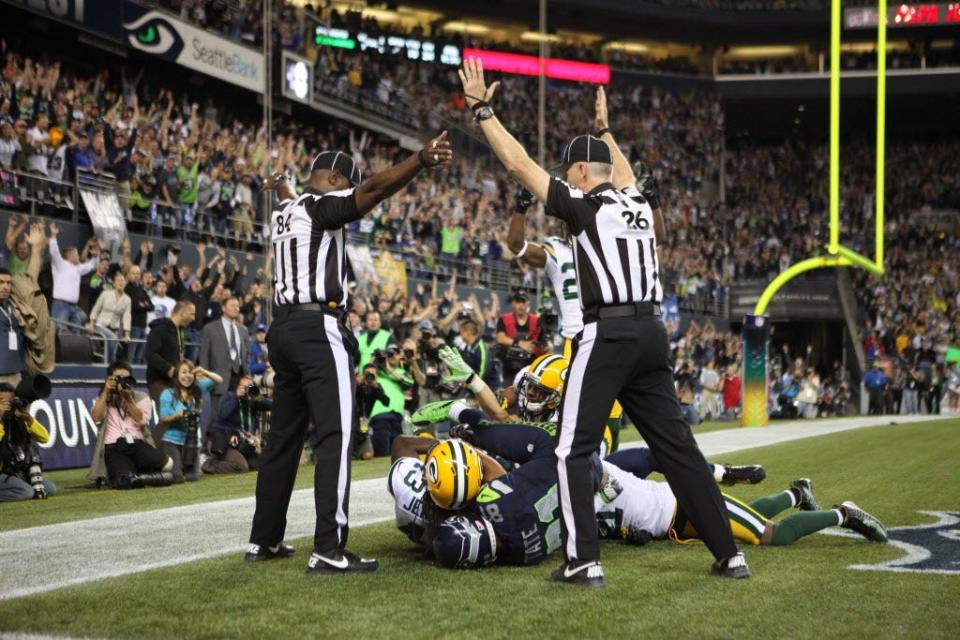
If one call has its own Wikipedia page, it's certainly dubious.
Serving as a flashpoint to bring an NFL referees' lockout to conclusion, the Seahawks "completed" a 24-yard prayer to Golden Tate as time expired to give the Seahawks a 14-12 win over the Packers on Monday Night Football.
Before making the catch, receiver Golden Tate shoved Sam Shields out of the way in an obvious case of offensive pass interference, but more importantly, the ball was caught first by Packers defensive back M.D. Jennings, while Tate only had a hand on the ball. Though one replacement official ruled for the clock to stop (perhaps indicating Jennings had intercepted the ball), the other ruled touchdown (ruling simultaneous possession and awarding the catch to the offense).
The replay official did not find enough evidence to overturn the call. Packers players reluctantly returned to the field for the point-after kick in a surreal scene.
8 years ago today: The "Fail Mary" happened.
This was wild.pic.twitter.com/BwVqfcfXv2— Ari Meirov (@MySportsUpdate) September 24, 2020
Two days later, the NFL reached an agreement with the NFL Referees Association, and the outcome surely played a role in expediting the resolution.
Alternate history: The Packers win that Seattle game, finishing the season at 12-4 and earning the No. 2 seed in the NFC instead of the No. 3. In reality, San Francisco got the No. 2 at 11-4-1, one-half game ahead of the Packers. Green Bay doesn't have to beat the Vikings in the first round (instead, San Francisco must beat Minnesota), but the Packers and 49ers still meet in the divisional round, with the battle at Lambeau instead of Candlestick Park. Given that Colin Kaepernick ran wild in the 45-31 blowout, we're not convinced a change of venue helps. Green Bay also lost against San Francisco to open the 2012 and 2013 seasons, and again in the playoffs after the 2013 season at Lambeau. The 49ers just had the Packers' number.
Rice fumbled (Jan. 3, 1999)
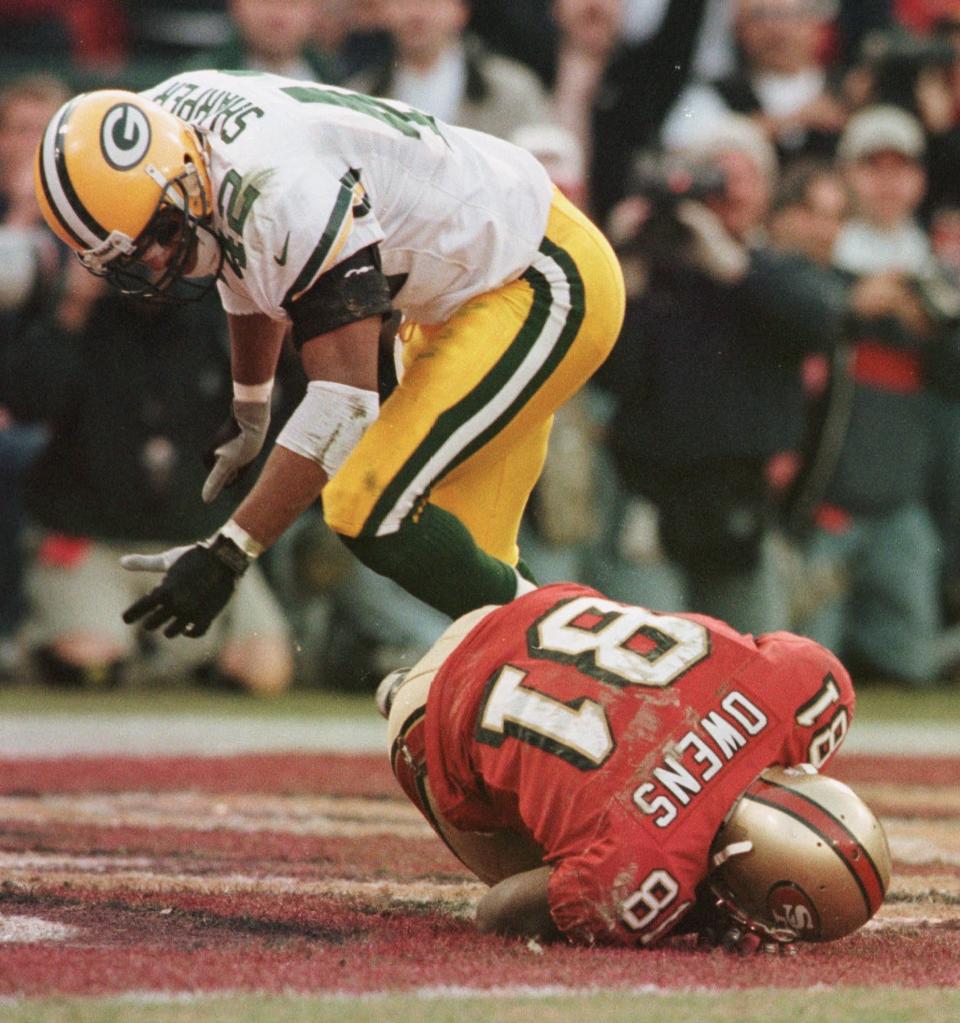
After back-to-back Super Bowl appearances, the 11-5 Packers took second in the NFC Central and had to face the 49ers at 3Com Park. Terrell Owens caught a 25-yard touchdown pass from Steve Young with 3 seconds left in a play that served as the arrival moment for the receiver's Hall of Fame career, but Packers fans remember a different play.
San Francisco's final scoring drive navigated 76 yards on nine plays, but on the fifth of those plays, another Hall of Famer clearly fumbled. Jerry Rice made only one catch in the game, but he lost the football and Bernardo Harris recovered near midfield with 35 seconds to go, a play that should have sealed the win. But Rice was ruled down by officials. The NFL adopted its full-fledged replay system for the following regular season in 1999, but for one last postseason, the call on the field was what mattered.
Fox's official broadcast footagehttps://t.co/P1ugCBFa3a
— Packers History (@HistoricPackers) January 3, 2019
Alternate history: The Packers win and move on to face second-seeded Atlanta in the Georgia Dome. Atlanta leaned quite a bit on running back Jamal Anderson, but the Packers had a good rushing defense that year, while the Falcons were weak against the pass, which is where Brett Favre naturally made a living. Let's say Green Bay prevails and reaches the NFC championship game … against a Minnesota Vikings team that beat the Packers twice that season. In real life, Atlanta won that game before falling to Denver in the Super Bowl. Maybe it's a blessing that the 49ers setback saved the Packers the indignity of a third straight loss to the Vikings, this time with a Super Bowl on the line?
The Danny Davis OPI (Jan. 1, 2020)
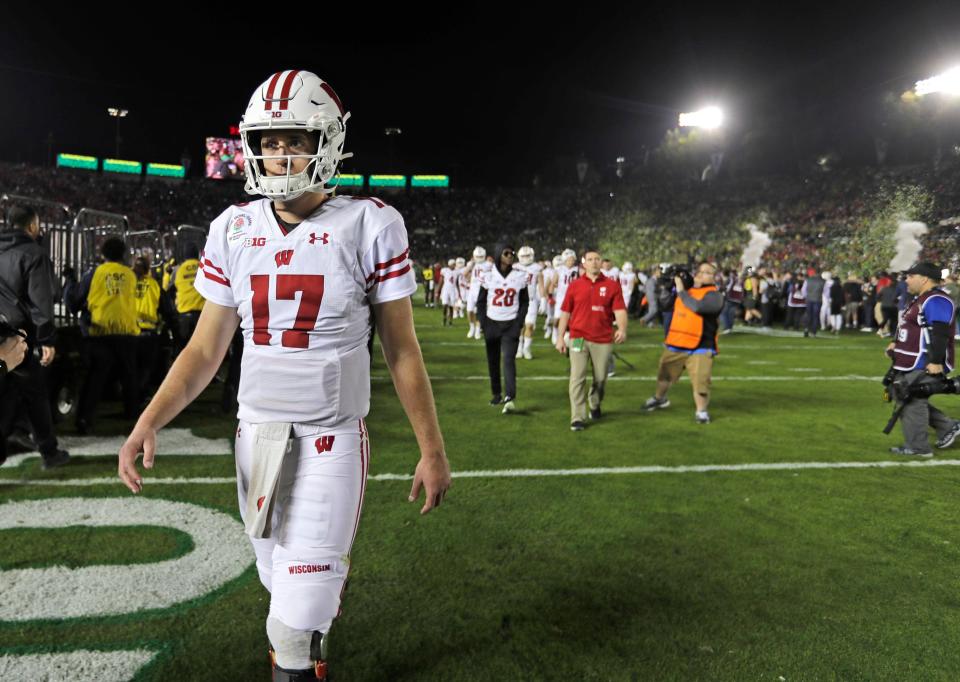
Facing Oregon in the Rose Bowl, the Badgers took a heartbreaking 28-27 loss in which several mistakes loomed large. But an offensive pass interference call against Danny Davis still smarts.
Driving with less than 4 minutes to go, Wisconsin appeared to convert on third-and-6 with a 9-yard pass to Jake Ferguson, but Davis was called for OPI, even though replays showed Davis didn't appear to be the one initiating the contact.
Longtime officials Terry McAulay and Gene Steratore both said afterward they didn't believe it should have been an OPI call.
Danny Davis on being called for OPI:
"I was just trying to work a release and he kind of grabbed me, clinched onto me. I just kept running and they ended up calling it. Can’t do nothing about it. I was just trying to get away from my man." pic.twitter.com/rk6NlOco1x— Zach Heilprin (@ZachHeilprin) January 2, 2020
Definitely doesn't feel right for such a close game to effectively end on that questionable offensive PI call.
— Stewart Mandel (@slmandel) January 2, 2020
Alternate history: Wisconsin would have had a first down at its own 35 with 3:15 to go, still time to make something happen but hardly a guarantee of points. But let's say UW keeps driving, sets up Collin Larsh for a game-winning field goal from between 25 and 35 yards out (he'd been good from 44 and 27 but missed from 47 in the game), and Wisconsin beats Justin Herbert and Oregon, 30-28. Paul Chryst, having never lost a bowl game in his time at UW, remains head coach through the 2022 season and beyond.
Justise touched it (April 6, 2015)
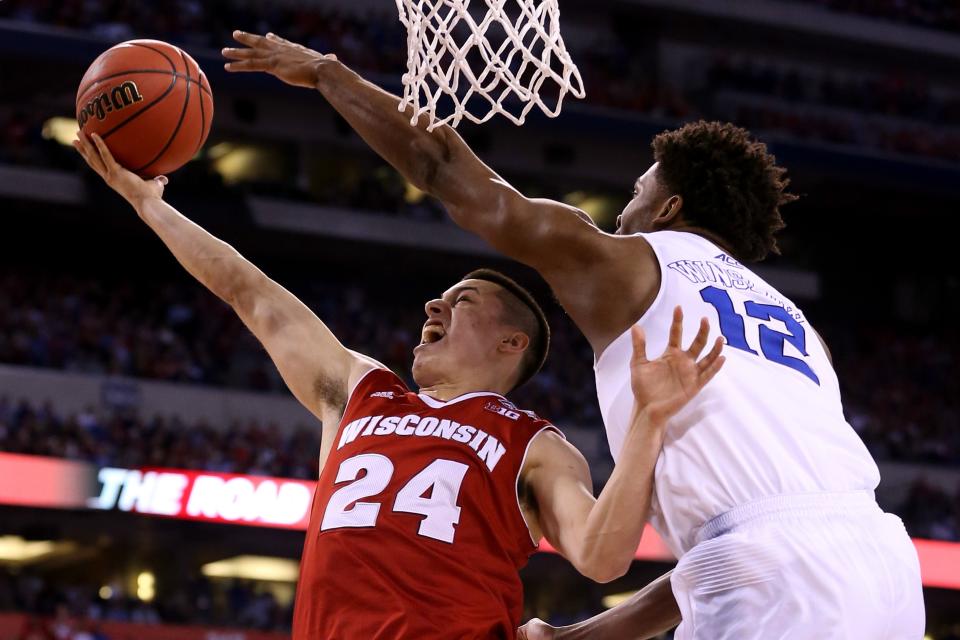
One of the key moments in Wisconsin's 68-63 loss to Duke in the national-championship game came with 1:51 left, when an out-of-bounds call was awarded to Duke but should have gone the other way.
Everyone at home could see the ball glance off Justise Winslow's fingertips and out of bounds after Bronson Koenig drove to the basket with the Badgers trailing, 63-58. The referees, however, gave it to Duke, even after replay.
NCAA head of officiating John Adams said a day later the referees got it wrong, but he also said they didn't have the angle that viewers at home did, which clearly showed the ball off Winslow.
Yep. https://t.co/Q9tE5lBhB0 pic.twitter.com/GZs2x89Q4Z
— Zach Heilprin (@ZachHeilprin) April 2, 2020
With the ball back in Duke's hands, Tyus Jones hit a 3-pointer and the Blue Devils' lead swelled to 66-58. And now, everyone who follows the Badgers knows what "Justise touched it" means.
Alternate history: Duke had seized control of the game in the preceding moments, and if anything, a stoppage in play like this long review was probably something UW needed, with Duke on a 13-4 run over the previous 6-plus minutes. If UW scores out of that inbound underneath its own basket, it's 63-60 or 63-61, and you can't deny that gives UW a chance to pull off the title. But it wasn't as if the call directly led to Duke points; the Blue Devils still had to bring the ball up the length of the court and scored in their half-court offense. UW answered Jones' triple with five quick points to pull back within 66-63 with 47 seconds to go, but Wisconsin never scored again. It just doesn't feel like the call itself kept Duke from winning this game.
Scott Williams (June 3, 2001)
Bucks big man Scott Williams threw an elbow in Game 6 of the Eastern Conference finals against Philadelphia star Allen Iverson, a play ruled as a Flagrant I during the game.
But after the game, NBA vice president Stu Jackson re-evaluated the play and upgraded it to a Flagrant II, giving Williams three flagrant "points" in the postseason and leading to a one-game suspension. That meant he'd be out for Game 7, the game that decided who would reach the NBA Finals.
Surely you know what happened next. With Darvin Ham in the starting lineup in lieu of Williams (and with Ham levied a foul in the game's first 8 seconds and his third midway through the first quarter), Philadelphia prevailed, 108-91. The last straw in a series of questionable officiating for Bucks fans, the outcome would forever be labeled a "conspiracy" among those who followed the Bucks and hadn't experienced a conference finals since 1986 (and not again until 2019), making it the only Bucks conference-finals run in a 32-year window.
Williams wasn't one of the team's top scorers but was an essential part of the team's fabric.
“I just remember the heartache, the pain of knowing we're a championship team and to sort of have it taken away from us, without one of our key figures who was playing well in that series,” Ham said in 2019, when he was a Bucks assistant. "To have it go down the way it did was unfortunate.”
Alternate history: The final score of Game 7 was lopsided, but the Bucks were within 76-71 late in the third quarter before the game got away. The Bucks already had won once in Philadelphia during the series, another game came down to the wire, and Milwaukee let Game 4 at the Bradley Center get away late. With Williams on the floor, Milwaukee beats Philly and advances to the NBA Finals, where the Bucks face a Lakers team they'd beaten twice that season. But we're not going to say they beat Shaq and Kobe, who went 15-1 that postseason with the only loss in Game 1 of the Finals to Philly, in overtime.
Jazz Peavy (Nov. 21, 2015)
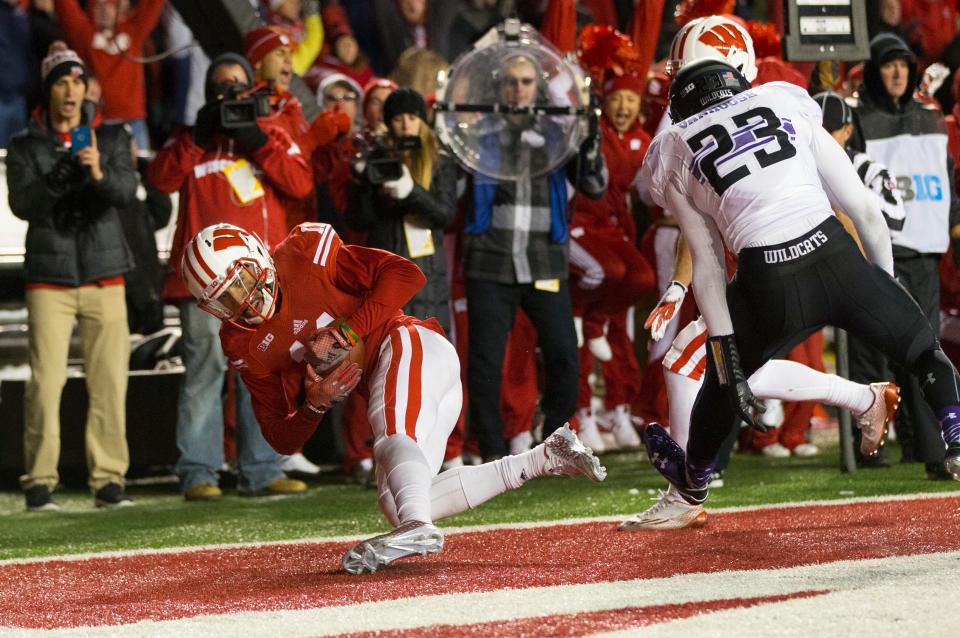
Virtually every fan base has a play that can be filed under, "Just what is a catch, anyway?"
With 30 seconds left against Northwestern at Camp Randall Stadium, Wisconsin quarterback Joel Stave appeared to find Jazz Peavy for a touchdown pass at the goal line that would have given the Badgers a 14-13 lead, pending the extra point. Peavy made the catch and took several steps in the end zone before falling to the ground with a knee still in bounds before he hit the sideline; referees ruled that he bobbled the ball and ergo didn't have full control on the catch.
(We have to acknowledge that this might have been ruled correctly, at least letter-of-the-law).
This was the Wisconsin TD that was overturned pic.twitter.com/5sAA7qzj9W
— Yahoo Sports College Football (@YahooSportsCFB) November 21, 2015
Replay upheld the ruling, and the Big Ten office reiterated that it was the right call. Stave wound up sacked on the next play and left the game injured, and Bart Houston threw incomplete on the game's final meaningful snap. Northwestern won, 13-7.
Both teams came into the game ranked, though the Badgers were favored and owned an 8-2 record. UW ultimately went 10-3 and defeated USC in the Holiday Bowl.
Alternate history: The Badgers still don't catch Iowa for the West Division title that year, but UW flip-flops destinations with Northwestern and winds up facing Tennessee in the Outback Bowl. The Volunteers crushed the Wildcats in real life, 45-6.
Desert storm (Sept. 14, 2013)
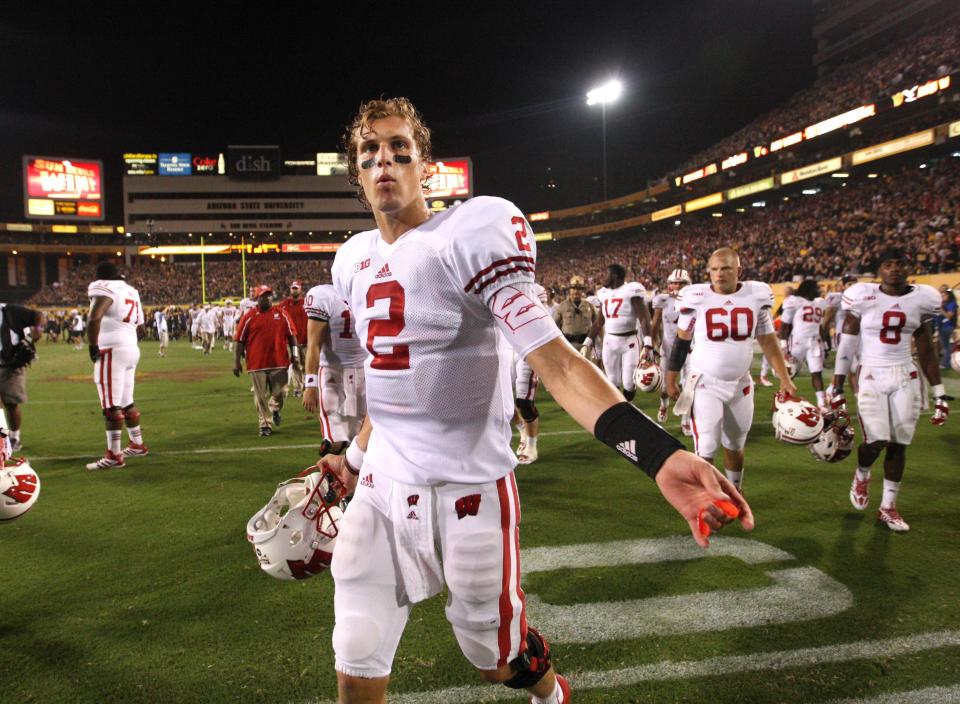
It was one of the strangest endings to a Badgers football game and had UW fans furious with Pac-10 referees.
Facing Arizona State in Tempe, the No. 20 Badgers took a 32-30 loss, with the final seconds coming under intense scrutiny.
UW, out of timeouts, drove to the Arizona State 13-yard line with 18 seconds left. On first down, quarterback Joel Stave ran to his left trying to center the ball for kicker Kyle French, willfully taking a quick knee and setting the ball down with the idea of setting up for a spike that would leave a couple seconds left for the kick.
Stave awkwardly placed the ball down at the 15-yard line without taking a hit, and officials let the clock run without making any signal, leading Arizona State players to jump on the ball while UW players screamed that the ball should have been reset. By the time the ball was spotted, UW didn't have time to run another play, and the game ended before the Badgers could snap for a spike.
Alternate history: Jen Bielema, wife of former Badgers coach Bret Bielema, never sends the infamous #karma tweet, but does anything else really change? The Badgers still had a chance to make a BCS bowl before a late-season loss to Penn State. With a win at ASU, they'd have been 10-2, just like Oklahoma and Clemson (BCS qualifiers), but those teams were already ranked ahead of UW before the Arizona State loss and it doesn't seem like they'd ever dip behind Wisconsin in the pecking order. Wisconsin finished 9-3 and still played in the Capital One Bowl, where it lost to South Carolina. That might happen anyway.
A close pitch in the World Series (Oct. 13, 1982)
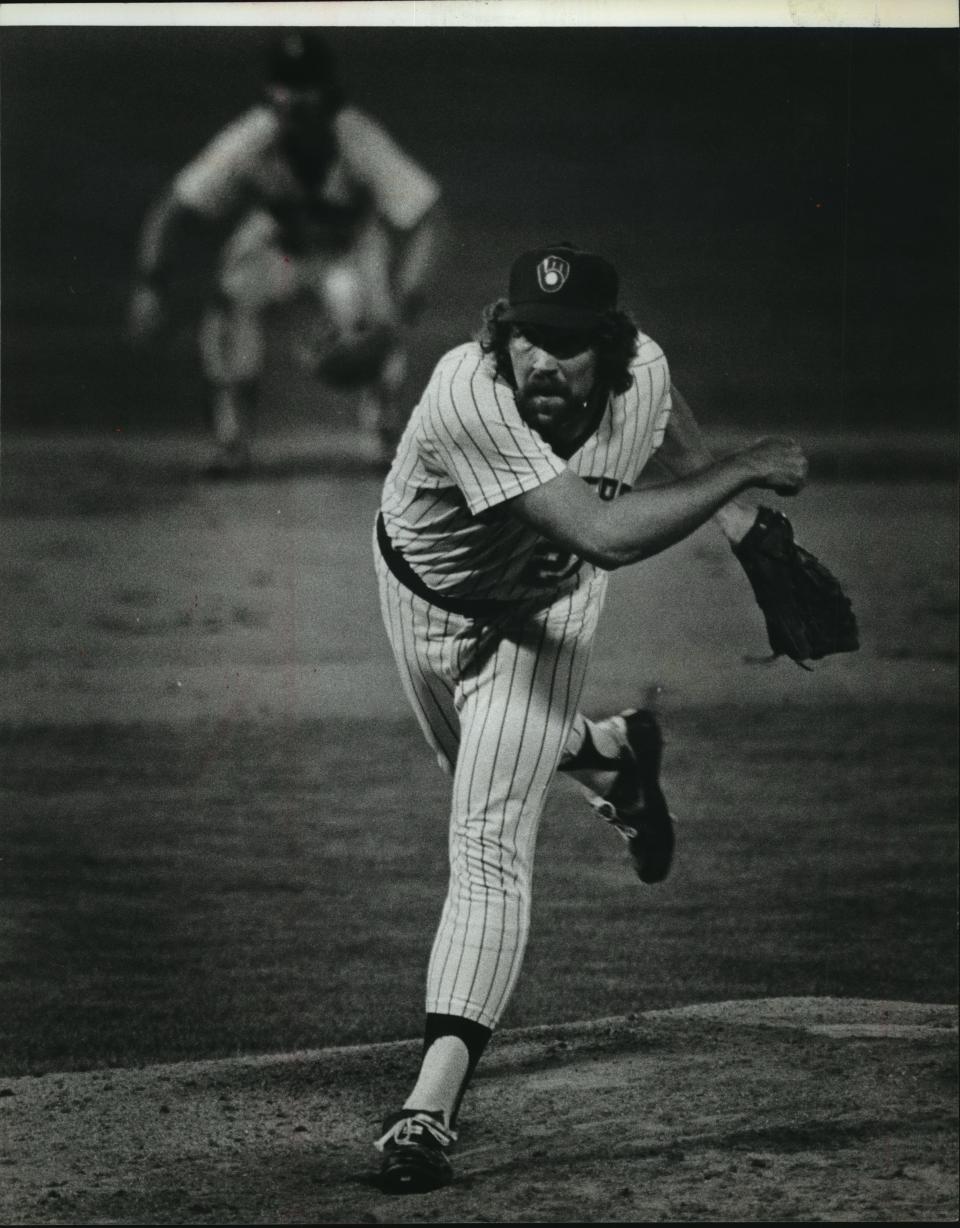
The Brewers and Cardinals were tied at 4-4 in the eighth inning of Game 2 in the 1982 World Series when Pete Ladd's 3-2 pitch to Lonnie Smith was called a ball by umpire Bill Haller, a controversial close pitch that even Smith thought marked the second out of the inning.
“I think it was there," Smith said. "The ump said it was outside. Umps are never wrong, they say. But I had no chance of hitting it.”
A rattled Ladd lost it from there, walking Steve Braun on four pitches to force in what became the winning run in a 5-4 win for the Cardinals. The Brewers, of course, went on to lose the series in seven games. Haller became a household name in Milwaukee, met with jeers and signs bearing his name when the series shifted back to Milwaukee.
"I deserved it," Haller said, speaking in St. Louis in 2007. "It was one of the worst games I ever worked."
Alternate history: Ladd gets Smith and gets out of the jam without allowing a run. Paul Molitor still bunts for a single leading off the ninth and then Milwaukee doesn't try to force the action with a hit-and-run play, which in real life led to a caught stealing when Robin Yount swung and missed. Instead, Molitor reaches second on Yount's groundout. Though Cecil Cooper still flies out, Ted Simmons delivers a go-ahead single and the Brewers win Game 2 to take a 2-0 series lead. Milwaukee wins the series in five games, with a 6-5 clincher in Game 5, and Simmons is remembered as one of the greatest Brewers players of all time. His No. 23 jersey hangs on the American Family Field façade next to Rollie Fingers, Molitor, Yount and Hank Aaron, and nobody even minds when the team recognizes its 1982 team every few years.
Jerome Whitehead (March 12, 1978)
Defending NCAA champion Marquette had a 68-58 lead on Miami of Ohio in the first round of the NCAA tournament when big man Jerome Whitehead went up for a rebound and got grabbed on the arm by Miami's John Shoemaker. No foul was called, but when Whitehead threw an elbow that caught Shoemaker in the face, Whitehead was ejected from the game. Coach Hank Raymonds was assessed a two-shot technical foul in the aftermath.
After making 3 of 4 free throws and a basket on the inbound, Miami cut the lead to 68-63 with 3:10 to play, then went on to win in overtime, 84-81.
Alternate history: Marquette wins handily, setting up a classic showdown in the Sweet 16. We'll say MU falls in the second round against top-ranked Kentucky, which goes on to win the national championship with a 30-2 record.
Dean Meminger fouls out (March 18, 1971)
In the NCAA tournament in Athens, Georgia, undefeated and No. 2-ranked Marquette fell in a brutal 60-59 setback at the hands of Ohio State in the second round, a game doubly notable for the final meaningful game in the decorated career of Dean Meminger (he officially wrapped his college career in the regional consolation game in a win over Kentucky). It's also the only game Meminger played at Marquette in which he fouled out.
The All-American was on the bench for the game's final 5:03, and MU lost for the first time in 40 games. When he left, Marquette had a 55-48 lead, but two free throws with 6 seconds left padded Ohio State's 1-point lead (with a last-second MU layup rendered meaningless).
As an added insult, Marquette's penultimate possession became a turnover when Allie McGuire inbounded the ball and quickly took a return pass, where officials ruled he still had a foot on the sideline.
Coach Al McGuire, who'd already butted heads with the NCAA over taking his team to the NIT instead of the NCAA Tournament in 1970, praised OSU afterward but included the refs on his team's "all-opponent team" at the season-ending banquet.
Alternate history: The only team ranked ahead of Marquette heading into the postseason was UCLA, the squad that went on to win the national title. And Marquette should have been there to face the Bruins for all the marbles. MU gets past Western Kentucky in the next round after Ohio State and then beats upstart Villanova in the Final Four. UCLA had incurred its lone loss that year to Notre Dame, a team Marquette defeated, and the Bruins went on to win 88 straight games in the aftermath of that setback. In real life, the Bruins took down Nova, 68-62, capping their fifth straight NCAA title on their way to seventh. We'll call it a toss-up whether Marquette short-circuits that legendary streak, and maybe the winning streak is only remembered as a 73-gamer today. It does feel wrong to pick against UCLA.
CC Sabathia's no-no-no (Aug. 31, 2008)
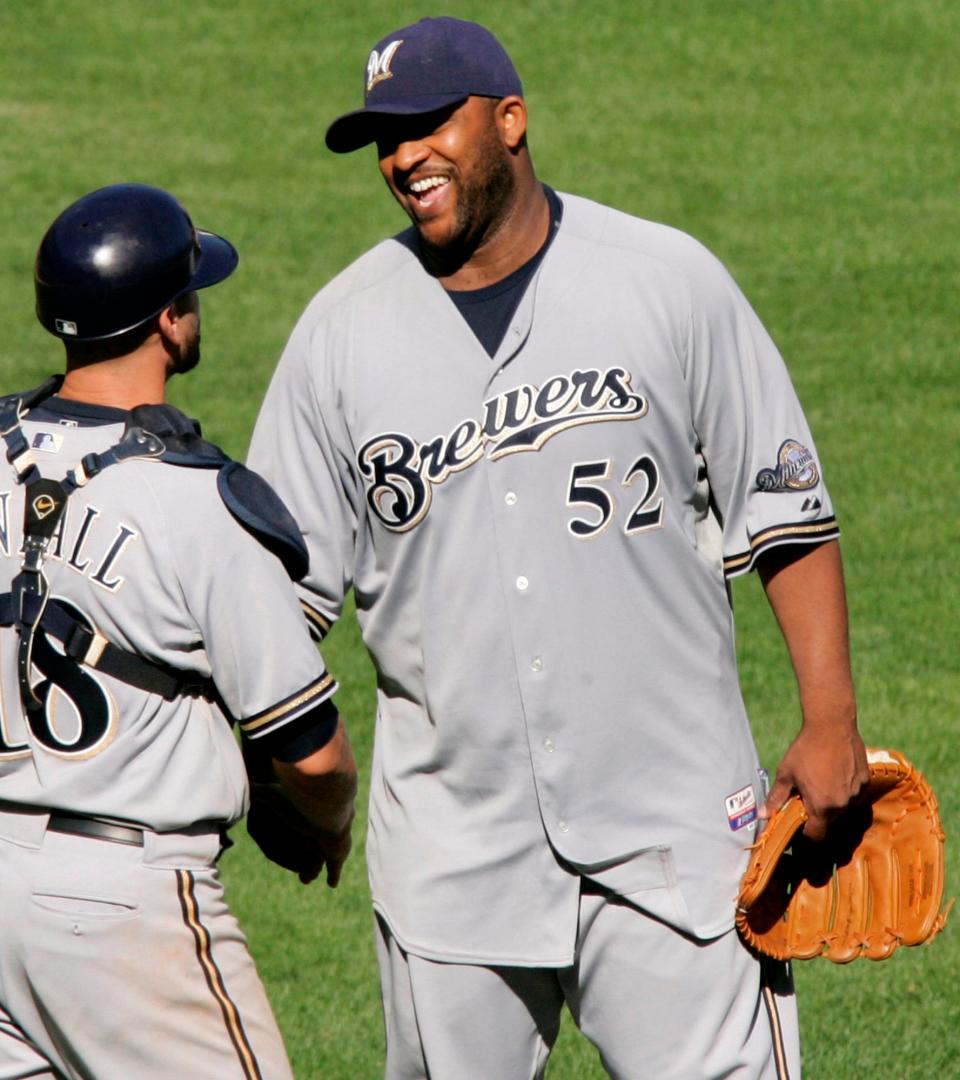
Everyone in Milwaukee learned the name of the Pittsburgh Pirates official scorer, Bob Webb.
In the midst of a thrilling Brewers season that included the midseason acquistion of Sabathia, the Brewers went to Pittsburgh and drubbed the Pirates, 7-0. But nobody was happy after the fact; a fifth-inning tapper by Andy LaRoche had been ruled a hit, even though Sabathia picked up the ball and subsequently dropped it.
The Brewers, with only one no-hitter in their history back in 1987, would have loved to add the grace note of a no-hitter to Sabathia's legendary run through the second half of 2008. Instead, he settled for a one-hitter, and an appeal went for naught.
The Brewers, despite a September tailspin that followed, still reached the postseason for the first time in 26 years in thrilling circumstances, and in 2021, Corbin Burnes and Josh Hader combined on that first no-hitter since 1987. But Juan Nieves is still the only pitcher to throw a complete-game no-no.
Alternate history: Sabathia gets the no-hitter (even though some quibble that it's a little cheapened by the fact that it was Sabathia's own error to allow it). His status as one of the all-time greats in Brewers history is only further cemented, even despite pitching just a half season. Realistically, nothing else changes.
JR Radcliffe can be reached at (262) 361-9141 or jradcliffe@gannett.com. Follow him on Twitter at @JRRadcliffe.
Our subscribers make this reporting possible. Please consider supporting local journalism by subscribing to the Journal Sentinel at jsonline.com/deal.
DOWNLOAD THE APP: Get the latest news, sports and more
This article originally appeared on Milwaukee Journal Sentinel: Referee and umpire mistakes that haunt Wisconsin sports fans

